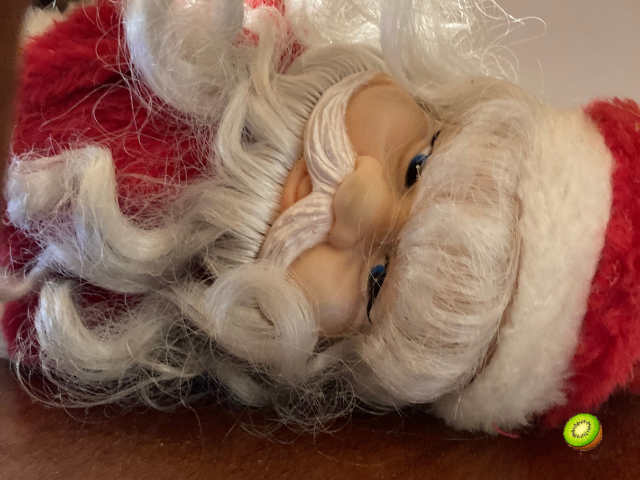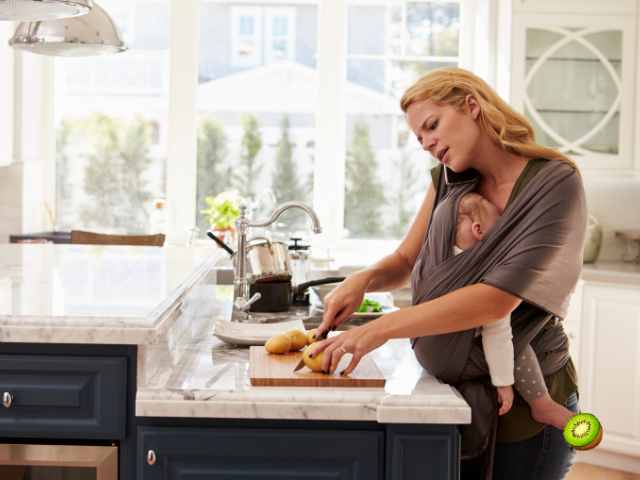Oct 21, 2024
The Santa Claus on my kitchen stool: a lesson in letting go and finding balance in homeschooling

Right now, there’s a Santa Claus sitting on a stool in the kitchen. We never use the stools; the counter where they sit is fragile, you can’t really lean on it, and the kitchen is small. So, we use the counter as a coffee bar, where you’ll find mugs, teapots (I loooove teapots), the coffee machine, and so on.
There’s a Santa Claus on one of the stools. He’s been there since last Christmas (and it’s now October). He was originally decorating a bookshelf, and in January, I found him there, staring at me with his big rosy cheeks, like a Santa Claus straight out of the 1980s. I told myself I’d take him down to the basement with the rest of the decorations. SPOILER ALERT: I never did.

There was a time when that would’ve driven me crazy. He would’ve been on my mental to-do list every single day, and I’d constantly beat myself up for not taking him down. But that was before I really understood the impact of having ADHD, homeschooling two kids, and having a husband with a visual impairment on my ability to get things done. I hit my limit pretty quickly, and at some point, when there’s too much to do, I just stop doing anything.
There’s a Santa Claus on a stool in my kitchen, and honestly, I don’t care. At this point, he’s ready for this Christmas. There you go! Human experience is a bit absurd when you think about it. Now that my kids are older, I have a lot less weight on my shoulders, and that’s when I fully embrace who I am. That’s also why I can totally accept Santa Claus sitting on my stool without a second thought.
I’ve spent so many years homeschooling, always feeling like I wasn’t doing enough. I homeschooled for 15 years, and I think I spent all 15 of them feeling like it wasn’t enough. But some moments were worse than others. There were times when I’d sit down at my computer to handle the support group, my volunteering for the association, or activities for my kids, and I couldn’t do anything. I’d sit there in front of the computer with the same posture as my Santa Claus—frozen, staring blankly, unable to move.

There were times when I was so drained, all I could do was cry. I worked in the evenings, homeschooled during the day, and had bronchitis that lasted for weeks. It was ridiculous.
Here’s what life has taught me about all of this.
1) Admit, recognize, and accept
The first step to avoiding burnout is recognizing the reality of the mental load that comes with homeschooling. Too often, we downplay the psychological and emotional toll of organizing lessons, managing the kids, and maintaining family balance. It’s important to accept that this role is demanding and that exhaustion is a very real risk. This awareness should come with open conversations with other family members, especially your partner, so they can understand the magnitude of your responsibilities. Acknowledging the challenges helps reduce guilt and allows you to find practical solutions, like delegating tasks or simplifying routines.
Strategies to avoid burnout:
- Regularly talk to your spouse or a trusted person to express your feelings.
- Reassess your expectations of yourself; perfection is not the goal, and the focus should be on family well-being.
- Schedule breaks to mentally and emotionally recharge.
2) Face your personal limits
Accepting your own limits is a key element in preventing burnout. Everyone has a different threshold for energy, and it’s crucial to learn how to say no or prioritize the tasks that matter most. This means letting go of the idea that you must “do it all.” As homeschooling parents, it’s easy to impose unrealistic standards on ourselves, whether it’s wanting to excel in every subject or maintain a perfectly tidy home.
Strategies to avoid burnout:
- Identify your physical and emotional limits: for instance, if you’re exhausted from a busy day, allocate recovery time.
- Use tools like priority planning: focus on one or two main tasks per day, and don’t stress over what can’t be done right away.
- Practice self-compassion: learning to forgive your own imperfections is essential for preserving your mental energy.

3) Continuous learning
The homeschooling world is constantly evolving, just like your children’s needs and family structure. What worked yesterday might not be effective tomorrow. So, staying informed and continuously learning is a powerful antidote to burnout. It’s not just about pedagogical techniques but also about discovering ways to better manage your time, emotions, and environment. Learning should be seen as a source of motivation rather than an additional burden.
Strategies to avoid burnout:
- Attend conferences or online workshops to discover teaching approaches better suited to your needs.
- Find mentors or join support groups where you can exchange insights on daily challenges.
- Diversify your learning sources: podcasts, books, or videos that spark your creativity and help you break out of the routine.
4) Give meaning to what you do
Intrinsic motivation is one of the most powerful drivers against burnout. Taking the time to reflect on why you chose homeschooling helps you reconnect with your values and mission. Sometimes, the daily grind can overshadow the deeper reasons behind your decision. By rediscovering this purpose, you can refocus and redefine your priorities, freeing yourself from external pressures.
Strategies to avoid burnout:
- Take a moment each month to write down or think about your core reasons for homeschooling.
- Align your daily activities with these objectives: for instance, if one of your values is autonomy, think of projects or approaches that promote this skill in your children.
- Share your motivations with your children; this creates coherence in your approach and can strengthen family engagement.
5) Have fun
One of the best ways to prevent burnout is to incorporate fun into your routine. Homeschooling shouldn’t be a constant chore. It’s important to create moments of joy, lightness, and celebration for yourself and your children. These moments of relaxation help relieve pressure and maintain a balance between productivity and well-being. Too often, the idea of “having fun” is seen as a waste of time, but it’s actually one of the best ways to recharge your energy.
Strategies to avoid burnout:
- Plan “off days” or spontaneous activities without a strict educational goal, like nature outings or family games.
- Encourage creativity and humor in your lessons: this could be through role-playing, experiments, or artistic projects.
- Take time for solo enjoyment, whether it’s through a hobby or a night out with friends, to recharge your batteries.

Letting go of unrealistic expectations and embracing the chaos has allowed me to find balance and joy in homeschooling. By accepting my limits, prioritizing well-being, and incorporating moments of fun, I’ve learned that success doesn’t lie in perfection but in resilience and connection with my family.